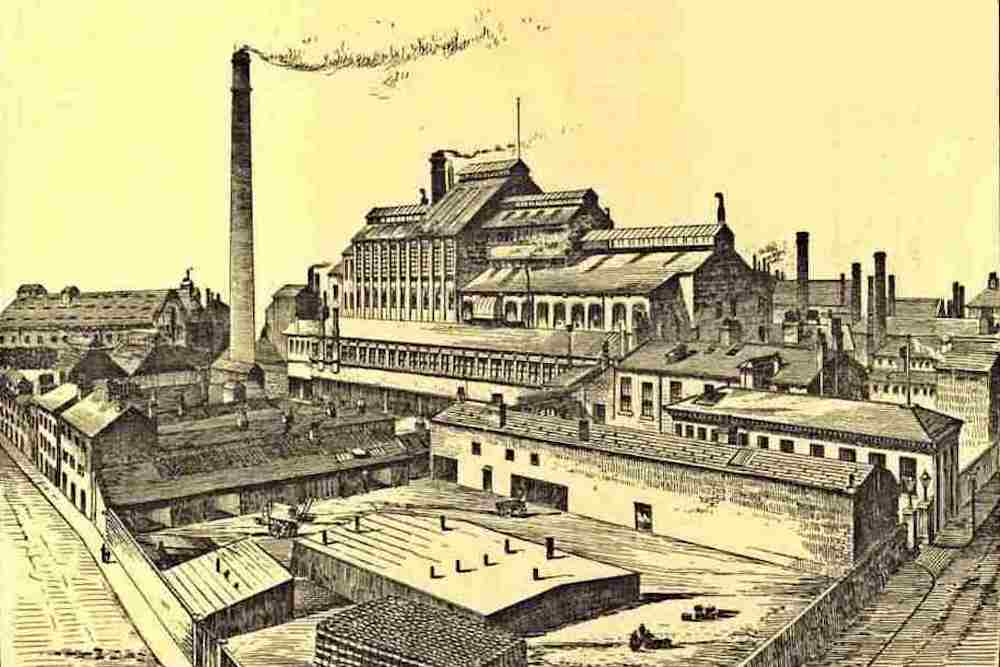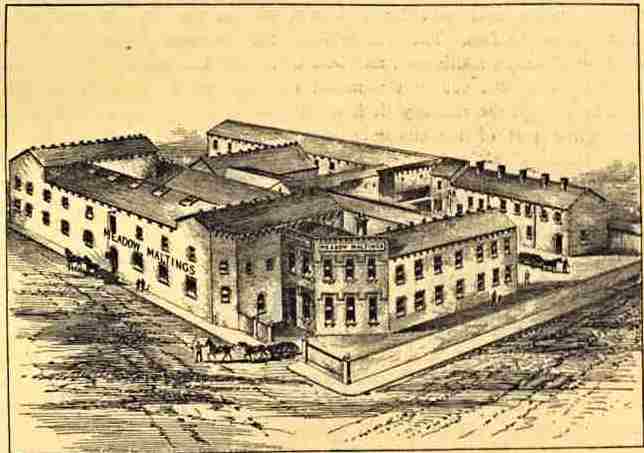
The public water supply was not really suitable for brewing beer until the 1860s when Leeds Corporation began to bring supplies from the Washburn Valley north of Otley, but beer was to remain a major item in most domestic budgets for at least the first half of the 19th century.
While it was true that the sulphur water of the Meadow Lane Spa by March Street on Dewsbury Road had a reputation for brewing a strong pot of tea, but in an area where engineering and foundry work was the main male occupation the sales of beer increased in line with population growth south of the River Aire.
The first reference to a common brewery being opened in Leeds was in the ‘Annals of Yorkshire’ which recorded that a public brew-house was built in Meadow Lane in 1756, it brewed about 50 Quarters of malt weekly which was enough to make 220 barrels of beer.
This brewery was later sold by Robert Denison in 1786 to a Thomas Jaques, a member of the Common Council of Leeds Corporation, it traded as Jaques & Company. In the 1830s TG Jaques retired from active life and although he was still listed as a partner in 1840 he had sold out to D W Nells in 1857 for £1,350.
The business then became Jaques & Nell, then it was owned by the Nell Family until it was sold to George Kitchen, a Maltster, in 1872. He then sold it to Tetley’s in 1899, they used it as a maltings until 1964.
A second brewery opened in Leeds, it was owned by Robert Arthington and was not far from where Tetleys brewery was 50 years later. An invoice dated 13 September 1775 shows that Arthington had sold a Mr Rhodes one cask of 8¼ gallons of beer at 6d (2½p) a gallon, total 4s.1½d (21p in present day money).
William Sykes was a customer of the Tetley family for malt and he started his brewery in Salem Place in 1792. An invoice dated 28 July 1796 records that he sold to a Mr Robert Harrison 10½ gallons of beer at 9d (4p) a gallon, total 7s.10½d (39p) this showed that there had been a 50% increase in beer prices over the last 20 years.
There was a small brewery that was started in 1820 by Sarah Holmes on Ivory Street, Pottery Fields, which ran in close connection with an adjacent malt kiln and was known as the Kiln Brewery, but by the late 1850s it had ceased production. On Pepper Road was the Grove Brewery, which was also developed from an established malting and lasted until about 1875 when the site was acquired for redevelopment for housing.
In 1827 Robert Arthington inherited the family brewery business, and around the same time a woollen merchant’s warehouse and dye shop in Hunslet Lane became empty and opened as William Spong’s Airedale Brewery, which lasted until about 1848 when it was demolished to make way for extensions to Kitson’s Airedale Foundry. These breweries were small and mainly operated from single storey or at the most two storey buildings with associated malt kilns and stabling for the dray horses. Apart from the malt of which there was a sufficient supply in the area they also needed a good supply of coal and water along with a good local market for the brew because beer travelled badly on wagons or drays.
Syke’s Brewery was opposite the Brandling coal staithes in Casson Close until the South Market was built there in 1823 when the railway was then pulled back to Kidacre Street. The Kiln Brewery was by the Middleton Railway while the Grove Brewery was close to the River Aire and the original Brandling tramway that used to carry coal to the river staithes.
Meadow Lane Brewery and the Airedale Brewery were a little further away from the supplies but near enough not to affect the cost of production.
The Moorside Brewery was further from the coal of Brandling’s pits but it was within half a mile of the coal pits in Beeston Township. There were few industrial sites in either Hunslet or Holbeck that were far from either a pithead or coal staithes. Sykes (Tetley’s) Brewery and Jaques & Nell Brewery had their own deep wells, but the water supplies for other breweries is uncertain but all were close to becks, Kiln and Airedale Breweries by Dow Beck and Grove Brewery close to Balm Beck.
It seems appropriate at this point to bring in a brief snapshot of the start of the Tetley Brewery.
Joshua Tetley was the third son born to William Tetley (Maltster) and Elizabeth Tetley, the daughter of Isaac and Sarah Rimington of North Hall, Burley Road, Leeds, and Cripplegate, London. The couple were married about 1771 in London. William and Elizabeth lived at Armley Lodge which faced onto the Branch Road junction and was later to become the home of the Armley Liberal Club.
They had eight children, William, 1772 who died aged two; Isaac, 18 November 1774; a second William, 9 October 1776; Joshua (founder of the Brewery), 20 July 1778; James Rimington, 5 December1780; Richard, 3 March 1872; David Rimington, 24 October 1785; and Sarah, 27 June 1787 who died six months later. On Christmas Eve 1788 Elizabeth died aged just 36 years.
It was not until Joshua Tetley felt secure enough to marry that he took the plunge. When he was 29 he married Hannah Carbutt the daughter of Francis Carbutt, a linen and cloth merchant of Leeds. Hannah was six years Joshua’s junior having been born on the 13 June 1784; the couple for some reason not known were married at Sheffield Parish Church on 12 March 1808.
The first home for Joshua and Hannah Tetley was in Albion Street and it was here that they had five children, all girls: Elizabeth, born 11 April 1809; Lucy Ann, 23 November 1810; Francis, 5 August 1812; Sarah, 30 November 1813; and Ellen, 22 December 1814.
Male succession was particularly important in those days. With business being so successful the family decided to move to Park Square and it was here they were blessed with their only son, Francis William who was born on 24 October 1817 and this was followed by another girl, Emma on 5 August 1820.
With the Tetley business as a Maltster being so successful Joshua was having a problem deciding whether to go into the brewing business. In 1822, at the age of 44, he had the chance to lease and buy the buildings and business of William Sykes at Salem Place, Hunslet Lane at a cost of £400. The deal was sealed on 31 October 1822 and the family moved to No.4 Salem Place and the start of the Tetley Brewery.
At the start of his brewing career only 12% of beer sold in Leeds and district was brewed by common brewers the rest being brewed by individual innkeepers. So Joshua kept his malt business going from the brewery, selling to the innkeepers and private houses that brewed their own beer and he also sold flour. It was here that their last child, Mary Louisa was born on 2 January 1824, of the family of seven girls and one boy only Frances William and Sarah married.

Joshua Tetley was a successful man and in 1839 he moved from the house in the brewery to a large and imposing residence. Belmont House was in Little Woodhouse, north of Park Lane, one of the best residential areas in Leeds and on 1 October 1839 he created Joshua Tetley & Son when he took his son, Francis William in to the business when he was 22 years of age.
Hannah Tetley died on 13 May 1857 aged 72 and was buried at Hampsthwaite, North Yorkshire and she was followed two years later by Joshua, aged 81 who died on 26 August 1859 and was buried with his wife at Hampsthwaite.
Joshua Tetley & Son lasted until 2011. It was a very sad day when Carling closed it down and moved production to Northampton. Once again we find another business moving from Leeds to other parts of the country or maybe even the world.
Whilst you’re here, can we ask a favour?
South Leeds Life is published by a not-for-profit social enterprise. We keep our costs as low as possible but we’ve been hit by increases in the print costs for our monthly newspaper – up 83% in the last 12 months.
Could you help support local community news by making a one off donation, or even better taking out a supporters subscription?
Donate here, or sign up for a subscription at bit.ly/SLLsubscribe




According to Wikipedia:
“The brewery’s [Tetley’s] closure was announced in 2008. A Carlsberg spokesman said, “It is an old brewery and the one in Northampton is bigger and modern.” In December 2010, production of Tetley’s cask products was transferred to Banks’s brewery in Wolverhampton. Tetley Smoothflow will be brewed by Coors in Tadcaster and Tetley keg Dark Mild, Mild and Imperial will be brewed by Cameron’s of Hartlepool. The final brew took place on 22 February 2011. Lager production was transferred to Northampton. Despite protests that Tetley Cask brewed in Wolverhampton would taste different, the new beer has been greeted with a warm reception.”
It was Carlsberg who owned Tetley’s and shut it down. The original cask bitter is now made in Wolverhampton but lacks that old distinctive flavour provided by Leeds water!